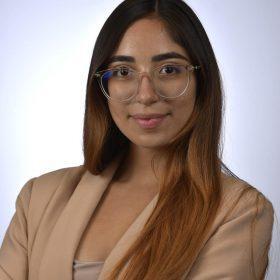Aeriell Armas Awarded Fellowship for Underrepresented Minorities in Research

Aeriell Armas, a PhD candidate in Clinical Psychology, was recently awarded a research fellowship with Translational Research Training in Addictions for Racial/Ethnic Minorities (TRACC). The fellowship is conducted in partnership with The City College of New York, Columbia University Medical Center, and Rutgers University-New Brunswick.
TRACC “aims to increase the number of scientists from underrepresented racial/ethnic minoritized groups conducting translational addiction research.” It achieves that by offering exceptional students from underrepresented racial and ethnic groups access to training in biomedical and behavioral research, software and technology, grants, mentorship, stipends, and funds for their own research projects.
Armas is originally from New York City and graduated from The City College of New York. While still a freshman, she took an Introduction to Experimental Psychology course with Dr. Theresa Lopez-Castro. This opened her eyes to the possibilities for research in psychology, not just in clinical work. “Her course made me realize this [research] could be something I do in my career,” Armas said. “Because, actually, I have a lot of questions about how people and groups of people work.”
Now at PAU, she is a graduate research assistant in the Maternal and Digital Research for Equitable Solutions (MADRES) Lab and she previously trained at La Clínica Latina within the Gronowski Center.
Her research interests focus on “intimate partner violence (IPV), mental health treatment and disparities among the Latine community, and digital therapeutics.”
The series of events that connected Armas to the TRACC fellowship could be described as coincidences, perfect timing, or a clear academic and professional vision, with a strong thread of mentorship and sponsorship throughout.
Dr. Lopez-Castro, the professor for Armas’ Intro to Experimental Psychology course, is also a mentor with TRACC and on the organization’s Executive Committee. This past summer, Armas and Lopez-Castro reconnected over Zoom and Lopez-Castro suggested Armas apply for a fellowship within the TRACC program.
Coincidentally, TRACC is partnering with the Dartmouth Center for Technology and Behavioral Health (C4BTH) for the first time this year. The Center’s focus is on “digital health tools for substance use, mental health and other health conditions.” Armas will be TRACC’s first Fellow with C4BTH and it should prove to be a good collaboration because, for her dissertation, Armas is developing an online psychoeducational intervention for Latina women exposed to intimate partner violence.
“This has been a wonderfully, weirdly perfect fit,” Armas said. It took adjustments to make the fellowship work for her, or to make her dissertation and workload work for TRACC, but “all those things happened because of the relationship I have with Dr. Lopez-Castro.”
Armas will continue her TRACC fellowship through the summer of 2023. The foundation of her year will be her dissertation, “Developing a Brief Internet Based Psychoeducational Intervention for Latina Survivors of Intimate Partner Violence.” Beyond that, Armas is exploring career options in academic research focused on Latina intimate partner violence, but she is also open to career options within the tech industry. In either endeavor, she would like to ensure that more historically underrepresented groups have access to higher education, mentorship, and research opportunities.


